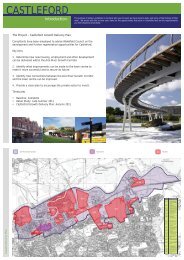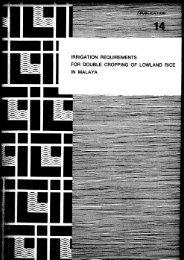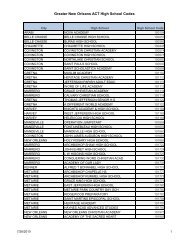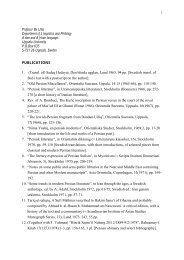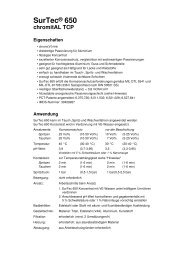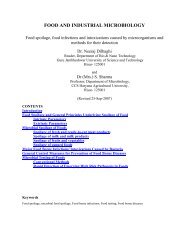On the Future of Indigenous Traditions - Munin
On the Future of Indigenous Traditions - Munin
On the Future of Indigenous Traditions - Munin
You also want an ePaper? Increase the reach of your titles
YUMPU automatically turns print PDFs into web optimized ePapers that Google loves.
The state administrative mechanism in <strong>the</strong> hands <strong>of</strong> people from <strong>the</strong>se adjoining<br />
regions or state, who have manipulate matter in <strong>the</strong> ways <strong>the</strong>y would go in <strong>the</strong>ir<br />
favour, or <strong>the</strong> groups <strong>the</strong>y represent, making <strong>the</strong> state its administrative system,<br />
including <strong>the</strong> legal systems, work to <strong>the</strong>ir advantage.<br />
A whole range <strong>of</strong> issues can be listed here falling out <strong>of</strong> <strong>the</strong> mentioned situation. <strong>On</strong>e<br />
among <strong>the</strong> important issues worth mentioning here is <strong>the</strong> census <strong>of</strong> population<br />
distribution <strong>of</strong> different groups. That is, if a certain block within a district or a district<br />
itself in a state, percentage <strong>of</strong> Adivasis is shown lower than a required for it to be a<br />
scheduled district; <strong>the</strong> general rule will be applied to <strong>the</strong>se areas as against <strong>the</strong> special<br />
rules for Adivasi dominated areas. It would no longer give special consideration to <strong>the</strong><br />
special rules that protect <strong>the</strong> Adivasis customary and traditional rights. The non-<br />
Adivasis coming from outside will be able to own land in <strong>the</strong>se regions for private<br />
and commercial purposes or exploit it for commercial purposes. Rules regarding use<br />
<strong>of</strong> forest and land, including timber logging, mining and o<strong>the</strong>r developmental plans<br />
will apply. Adivasis in this case will no more be having special privileges as against<br />
<strong>the</strong> general category population. The general category groups see most <strong>of</strong> <strong>the</strong>se areas<br />
as potential areas for commercial exploitations, which today <strong>the</strong>y claim <strong>the</strong> Scheduled<br />
Area’ rules to be an obstacle in its exploitation. In <strong>the</strong> last section <strong>of</strong> <strong>the</strong> next chapter I<br />
have elaborated how <strong>the</strong> re-distribution <strong>of</strong> blocks and districts can show <strong>the</strong> Adivasis<br />
to be less than <strong>the</strong> required percent in <strong>the</strong> census, thus <strong>the</strong> threat <strong>of</strong> de-scheduling <strong>of</strong><br />
<strong>the</strong>se areas. However, before this we shall discuss in <strong>the</strong> following chapter <strong>of</strong> <strong>the</strong><br />
political association <strong>of</strong> <strong>the</strong> Adivasis, investigate where <strong>the</strong> difference lies and its<br />
importance.<br />
56



